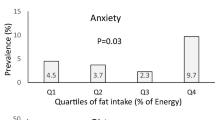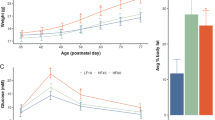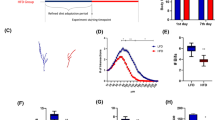Abstract
Background:
The consumption of diets high in calories and low in nutrient value is becoming increasingly common in modern society, which can lead to metabolic disorders like diabetes and obesity, and potentially to psychiatric disorders. We have performed studies to assess how the shift from a healthy diet rich in omega-3 fatty acids to a diet rich in saturated fatty acid affects the substrates for brain plasticity and function, and anxiety and depression-like behavior. Methods: Pregnant rats were fed with omega-3 supplemented diet from their 2nd day of gestation period as well as their male pups for 12 weeks. Afterwards, the animals were randomly assigned to either a group fed on the same diet or a group fed on a high-fat diet (HFD) rich in saturated fats for 3 weeks. Anxiety and depression-like behaviors were assessed by using open field (OF) and elevated plus maze (EPM). Molecular assessments were performed in the frontal cortex and hippocampus as dysfunctions in these brain regions are main contributors towards depression, anxiety-like behavior and stress.
Results:
We found that the HFD increased vulnerability for anxiety and depression-like behavior, and that these modifications harmonized with changes in the anxiety-related neuropeptide Y (NPY)-1 receptor. The HFD reduced levels of brain-derived neurotrophic factor (BDNF), and the BDNF signaling receptor pTrkB, as well as the cyclic AMP response element binding protein (CREB), in these brain regions. Brain DHA contents were significantly associated with the levels of anxiety and depression-like behavior in these rats.
Conclusions:
These results suggest that the change in dietary lifestyle leading to alteration of dietary n3/n-6 fatty acids levels imposes a risk factor for anxiety-like behaviors. Dietary DHA might help for building cognitive reserve that can resist psychiatric disorders.
Similar content being viewed by others
Article PDF
Author information
Authors and Affiliations
Corresponding author
Rights and permissions
About this article
Cite this article
Sharma, S., Zhuang, Y. & Gomez-Pinilla, F. Diet transition to a high-fat diet for 3 weeks reduces brain omega-3-fatty acid levels, alters BDNF signaling and induces anxiety & depression-like behavior in adult rats. Nat Prec (2012). https://doi.org/10.1038/npre.2012.6950.1
Received:
Accepted:
Published:
DOI: https://doi.org/10.1038/npre.2012.6950.1



